The Trans-Siberian Railway: Here's all that you need to know on trains, comfort, safety, food and ticket

Mail This Article
"Travel is about the gorgeous feeling of teetering in the unknown.” – Anthony Bourdain
Train journeys have a unique charm but also have their peculiar challenges, especially if they are undertaken in an overseas country. The fear of the unknown may grip some, though distant lands always fascinate intrepid travellers. This is particulary true if a Trans-Siberian railway journey is on your mind.
Before you book the dream trip it is quite natural to have apprehensions on what to expect as you travel across Russia for a week. You might feel a little edgy as the date to set out on the world's longest train ride from Moscow to Vladivostok nears. The same is likely if you are planning the Trans-Manchurian or Trans-Mongolian railway ride to China or Mongolia.
The three countries are unlike any typical Western nation in terms of their political systems, type of government and even openness to foreigners or tourists. The general perception is that they are least welcoming to visitors, but overseas tourists, especially those from the West, long to visit Russia and China in particular despite sporadic upheavals on the political or diplomatic front.
Here we take a look at the trains on the route and their classes, safety and comfort on board, the availability of food and drink, how to book tickets as well as the likely train fare and total expenses for the dream trip. In short this guide will detail what to expect on a Trans-Siberian journey.
1. The trains on the route
Long-distance trains of the Russian Railways include branded and non-branded trains. The branded trains are referred to as firmenny (Фирменный) and have different names like Arktika, Sapsan, Volga, Rossiya etc.
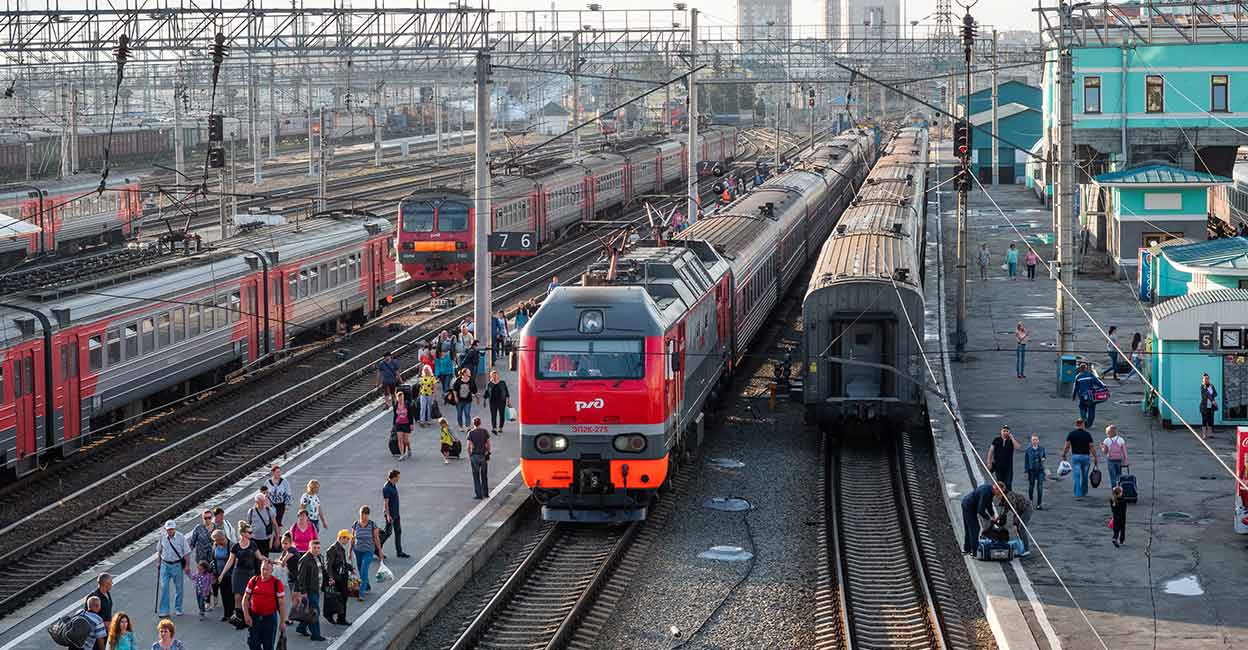
a. The Rossiya
The Rossiya (Россия), meaning Russia, links Moscow Yaroslavsky railway station to Vladivostok. It is Russian Railways train 001Э/002Э. The high-speed (160 km/h) air-conditioned deluxe train is preferred by overseas tourists to other regular direct services on the Trans-Siberian route as the onboard attendants speak English. The ticket price includes the price of meals.
The Rossiya stands out from other trains with its distinct white-blue-red colours of the Russian flag and the RZD logo of the Russian Railways Company.
Train No 001Э runs from Vladivostok to Moscow Yaroslavsky.
Train No 002Э runs from Moscow Yaroslavsky to Vladivostok.
This premium train nowadays departs from Moscow and Vladivostok daily. The journey time is about 6 days, 22 hours and 42 minutes.
Train No 002Э departs from Moscow after midnight at 00.35 hours and arrives in Vladivostok at 6.17 am on Day 7 — both local times. If you leave from Moscow on a Monday, a little after midnight, you will be in Vladivostok early in the morning on Sunday.
Train No 001Э now leaves Vladivostok at 22.25 and reaches Moscow Yaroslavsky at 11.13 am. The journey time is 6 days, 19 hours and 48 minutes, a few hours shorter than the east-bound trip.
For instance, if you leave from Vladivostok late in the evening on a Monday, you will be in Moscow just before noon on Sunday.
The important stations en route are: Vladimir, Nizhny Novgorod, Perm, Yekaterinburg, Omsk, Novosibirsk, Krasnoyarsk, Irkutsk, Ulan-Ude and Khabarovsk.
b. Train nos 061M/062M and 99/100
Two non-branded (nefirmenny) Russian Railways trains too link Moscow to Vladivostok directly. They are Train nos: 061M/062M and 99/100. Both depart from/arrive at the Yaroslavsky station in Moscow.
Train no: 061M/062M with about 75 stops is the fastest of all the three. It currently runs four days a week: Sunday, Monday, Thursday and Friday. On Saturday, train no 062Щ is available on the route. It has coupled car for direct travel to destinations such as Novosibirsk, Tomsk etc.
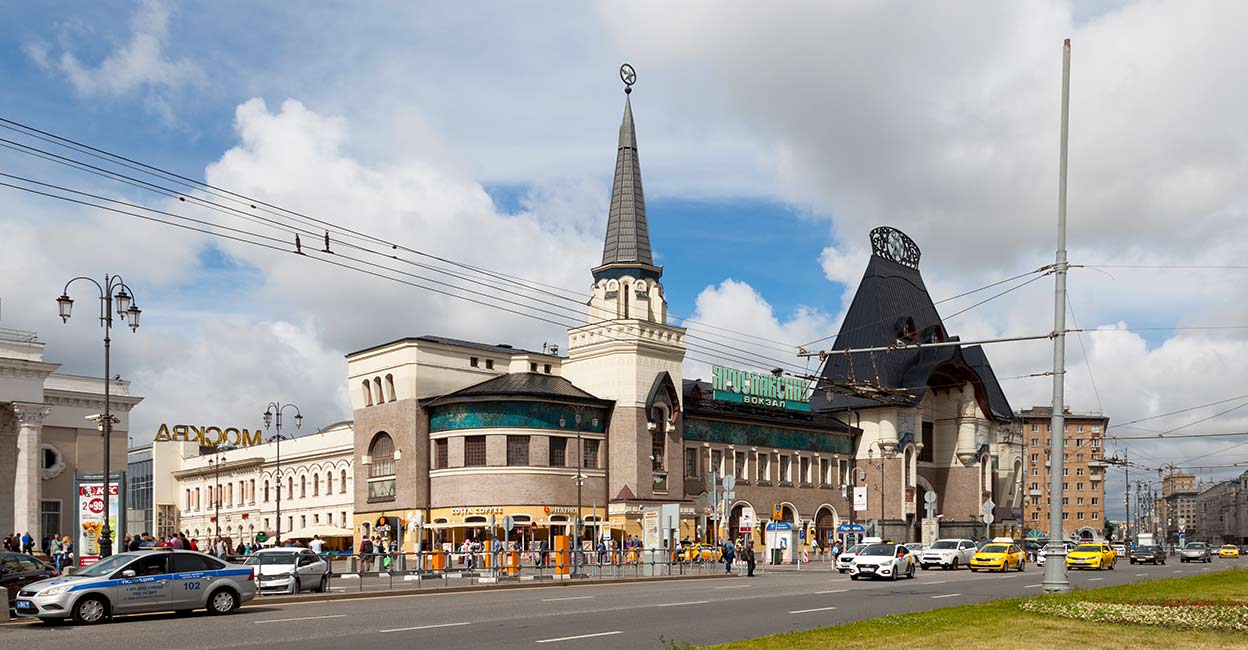
The Rossiya, on the other hand, has nearly twice the number of stops of 061M/062M.
Train no. 061М leaves Vladivostok at 16.48 hours and arrives at Moscow Yaroslavsky station at 13.58 hours on the seventh day. The journey time is 6 days, 2 hours, and 10 minutes. Train no:062M leaves Moscow Yaroslavsky at 23.45 hours and arrives at Vladivostok at 9.50 hours in 6 days, 3 hours, and 5 minutes.
Train no: 99/100 runs daily. It is the slowest of the three services linking Moscow and Vladivostok. It takes about 162 hours to cover 9,301 km on a slightly different route. The Moscow departure time of train no. 100 is 00:35 and the Vladivostok arrival time is 06:06 — a travel time of 166 hours. The west-bound train no.99 leaves Vladivostok at 00:33 and reaches Moscow Yaroslavsky in 161 hours at 11:13.
NOTE:
The exact time may be different on some days and the frequency may vary at times.
Э is the Russian letter that sounds as 'ye'; the English equivalent being E.
c. Trains for intermediate or international journeys
For shorter journeys on the Trans-Siberian routes you may consider booking tickets on the following trains after deciding on the places you intend to visit between Moscow and Vladivostok. Depending on availability you may also try tickets for intermediate destinations on the Moscow-Vladivostok train too.
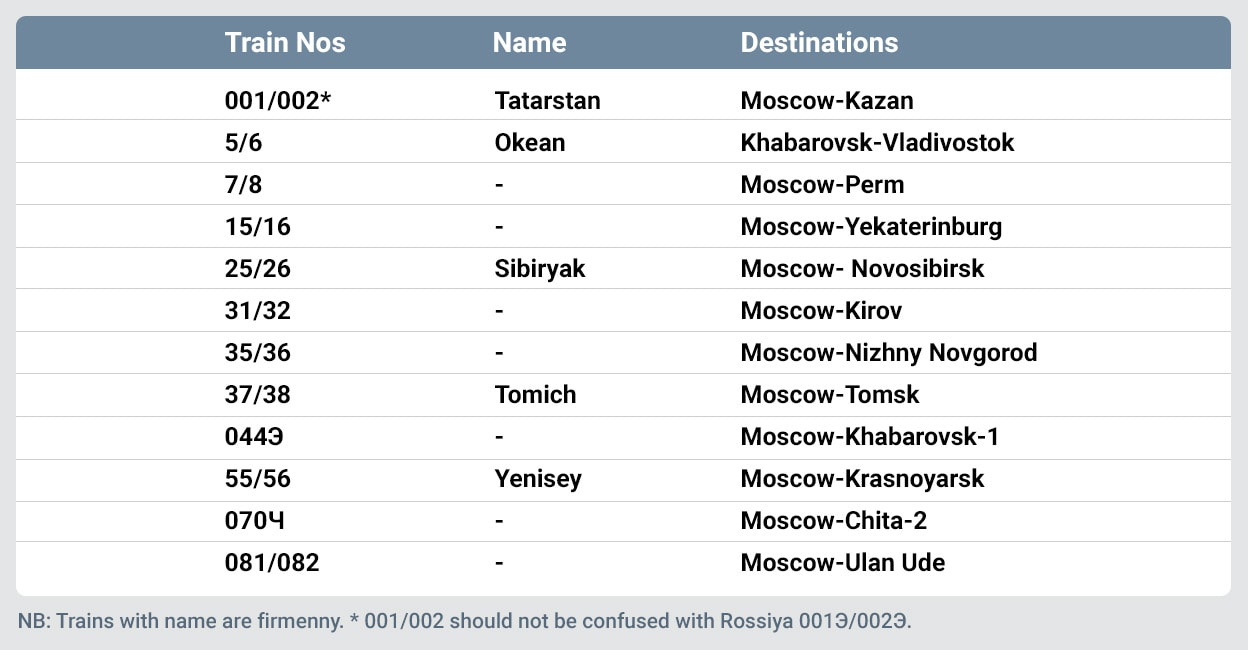
International trains and solely tourist trains run by private companies are also conducting services on the Trans-Siberian routes and its main branch routes.
Special private luxury trains are run only on certain dates a year. Ex: Tsar’s Gold, The Golden Eagle and Imperial Russia, the latter is of the Russian Railways.
NOTE:
1. 'Vostok' means 'East'.
2. Trains 3/4 and 19/20 have no stopovers. Once you depart from Moscow you can get down only at Beijing.
3. The Trans-Manchurian 'Vostok' (19/20) enters China directly from Russia. The train skips Mongolia altogether unlike the Trans-Mongolian Express.
4. The trains 5/6 on the Moscow-Ulan Bator route run every week between late May and late September; but off-season they curtail service and are available on alternate weeks.
5. Train 305: Ulaanbaatar to Irkutsk; departs at 15:22 on Tuesdays, Saturdays and Sundays from May to August; arrives in Irkutsk at 15:15 on the next day.
Train 306: Irkutsk to Ulaanbaatar; leaves Irkutsk on Mondays, Tuesdays and Fridays at 07:57 from May to August; arrives in Ulaanbaatar at 06:38 next day.
6. Ulaanbaatar to Irkutsk distance of 1,113 km is covered in about 23 hours.
2. Types of Carriages
With modern wagons the branded trains with sleeper coaches are ideal for a trip on the longest direct passenger train route in the world. Recent travellers can vouch that a pleasant ride without a single jerk could be expected on the entire line on the sleek wagons being used nowadays. Such comfort could be expected on non-branded trains too with the latest rolling stock.
The following three classes or types of carriages with varying comfort levels are available on most Trans-Siberian trains:
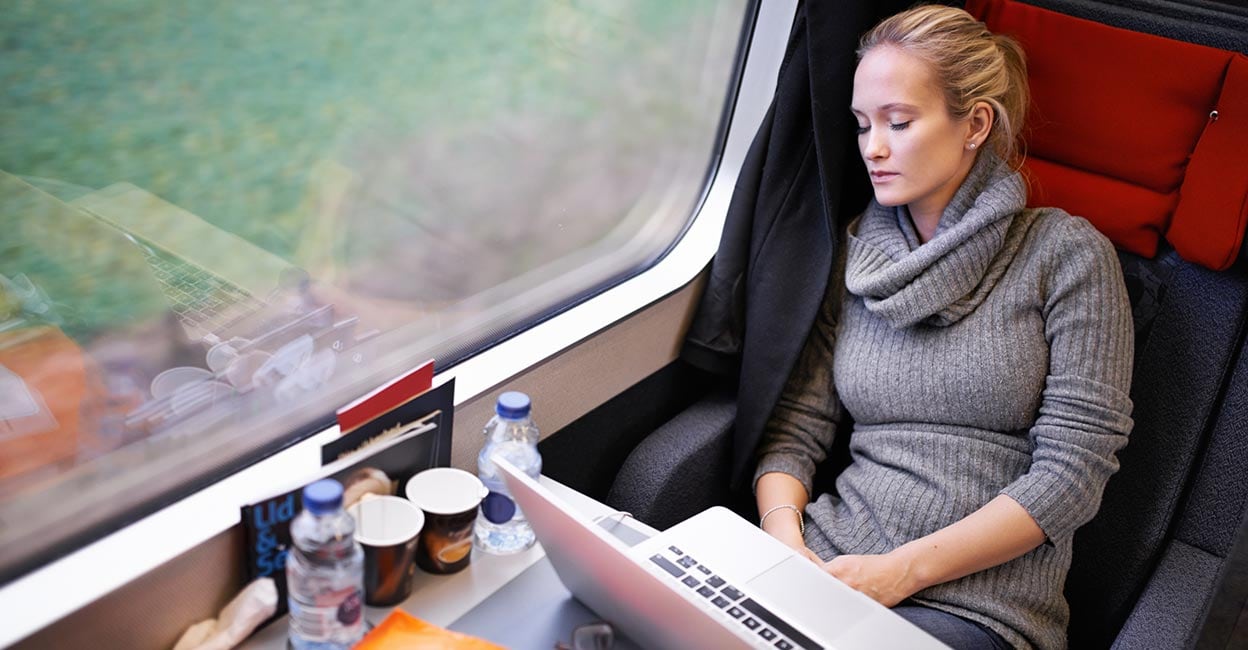
1. Spalny Vagon, or SV for short, is the First Class coach. Each wagon has cozy and spacious nine lockable compartments/cabins with two berths each, thus allowing for a total of 18 occupants. The seat doubles up as berth. On most trains the seats face each other and there is no berth above them. The fare is almost thrice that of the next class, Kupé. Despite comfort, you may have less chances of socialisation on an SV.
2. Kupé is the Second Class coach. Each wagon has nine lockable compartments with four berths each. The capacity is 36 passengers. Kupé is preferred by overseas tourists as it is relatively affordable for the comfort it offers. Its compartment is not as spacious as in SV. In Kupé you get more chances to interact with native passengers. It is similar to the (First-Class) Sleeper Coaches of the Indian Railways. A Kupé ticket costs double the fare for the next lower class, Platzkart, though the price goes up in peak season.
Common facilities/features on Spalny Vagon and Kupé include biotoilets, LED lights, personal reading lights, lockable sliding door for the compartment, a safe with electronic lock on the backrest, coat hangers, sockets, mirrror, foldable sidetable, a compact storge space above the doors, electronic information panels alongside the corridor. Two toilets with small wash-basins are located at one end of the car.
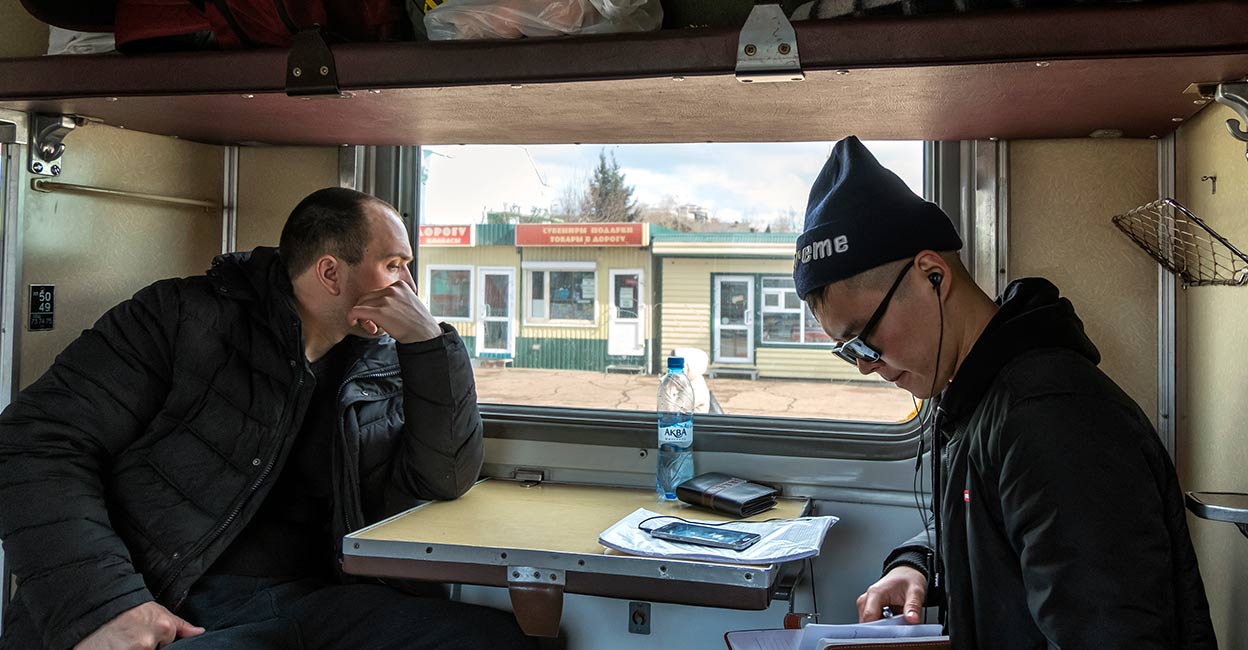
3. Platzkart is the Third Class. It is exactly like the Sleeper Coaches of the Indian Railways. Opt for Platzkart if you are on a tight budget, have no privacy concerns, have no precious items in your luggage and love to chat up with the natives. It is totally unlike the comfortable suite-like SV cabins and its nearest class, Kupé. The Platzkart has an open layout and look like dormitories. It is often found with nine bays with six berths each. In a bay, one side of the aisle has four berths (two below and two above) and the other side has two longitudinal berths (two below and two above). The total capacity of Platzkart is 54. Two toilets each are at both the ends of the wagon. Platzkart obviously is the cheapest option with berth for a long-distance journey.
Myagky or Lyux is the Luxury Class. Such Premium (премиум) coaches with fewer passengers are available mostly on private trains or on a few trains of the Russian Railways. The number of compartments/cabins is often 4 or 6. A compartment is occupied by one or two persons. Private toilet is available within the compartment. TV and individual ACs too are other amenities. A shower cabin is another facilty unavailable on other classes; this could be a common facility on the wagon or a private one within the compartment.
NOTE:
1. Russians say 'wagon' (вагон in Russian) for the coach and not 'compartment' or 'bogie' like Indians refer to them. Also, they mention the track number rather than the platform number when speaking about a train arriving at or departing from a station. The Russian word вокза́л, pronounced 'vokzal', denotes 'station'.
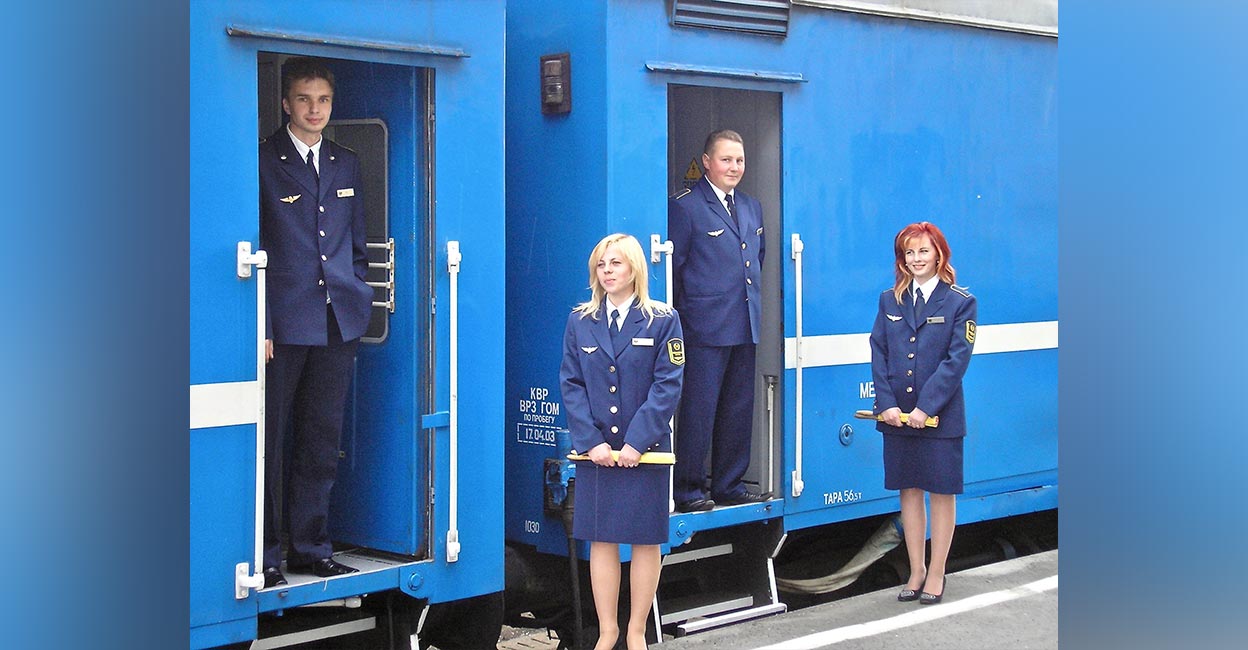
2. Smoking is banned on all Russian trains.
3. Hot and cold water are available in the toilets in all classes.
4. The space for shower is wedged on the side of the toilet. The Rossiya has shower cabins on a separate wagon. You may use the facility by paying a small fee.
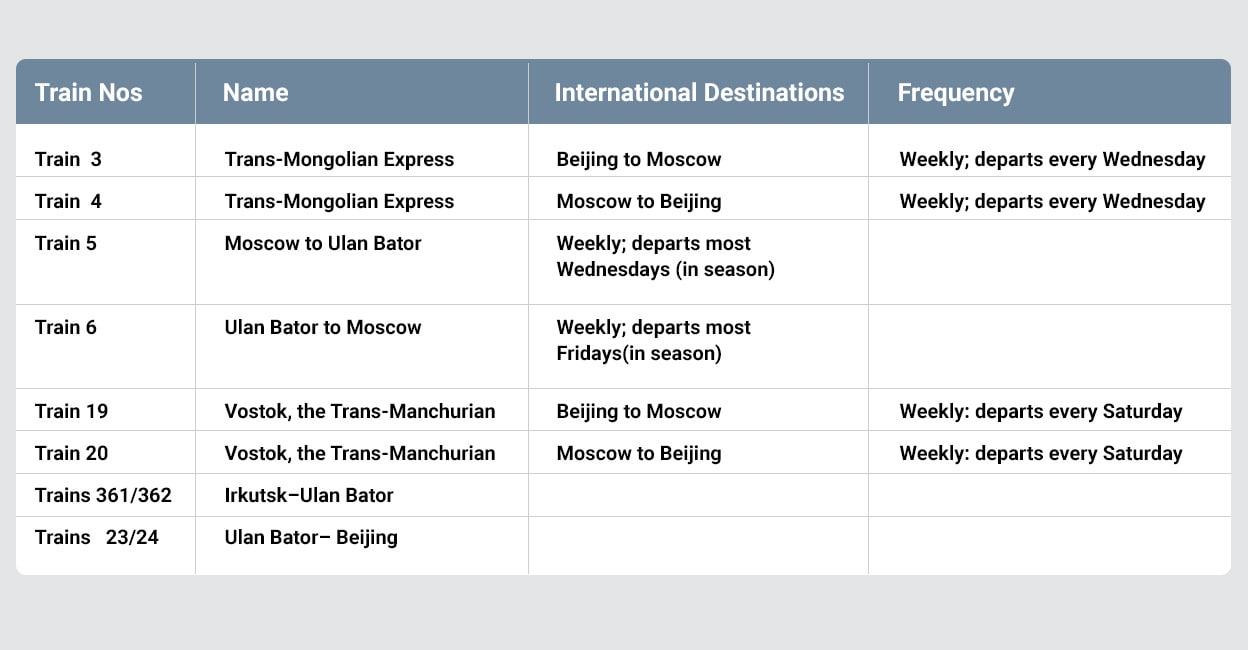
A tiny wash-basin dispensing hot and cold water is inside the toilet. Garbage bins with separate slots for metal and plastic are tucked firmly in the corner opposite the toilet.
5. Look for your blankets on the seat or upper berth. The conductor/carriage attendant — called provodnik or provodnitsa — will give you the bed linen: the set comprises clean sheets, towels, and pillows.
3. Safety
You are safe on a Trans-Siberian train even as you cross the vast land mass of the Russian Federation. But don't let your guard down while on the train and on the platform.
You may travel without fear as no ticketless rider enters the coach as the conductor does a preliminary screening of the tickets at the platform itself as you queue up to board. The conductor cross-checks the details on the ticket with those on the electronic hand-held terminal. Once you are seated, the conductor rechecks your ticket. Passports have to be shown by foreigners.
CCTV cameras are in operation in the corridors of the coach. The corridors remain closed and have automatic doors at either end. Armed police teams do patrol occasionally. Sniffer dogs are occasionally brought in to look for suspicious articles. Fire alarms too are installed.
No unauthorised entry can miss the eye of the train conductors who are assigned the charge of only a few coaches. Access is regulated ALWAYS. Not all doors of the train remain open when it halts at a station. Only one door on one side of the train is kept open for the few coaches under the charge of a conductor as the train halts. This practice could be emulated by the Indian Railways to ward off petty criminals and tickeless travellers even though the sheer numbers that board and alight from its trains is no comparison to those in Russia. Moreover, keeping the doors shut when the train is in motion goes a long way in avoiding nuisance as well as preventing falls. The lever-operated doors are opened and closed by the conductor.
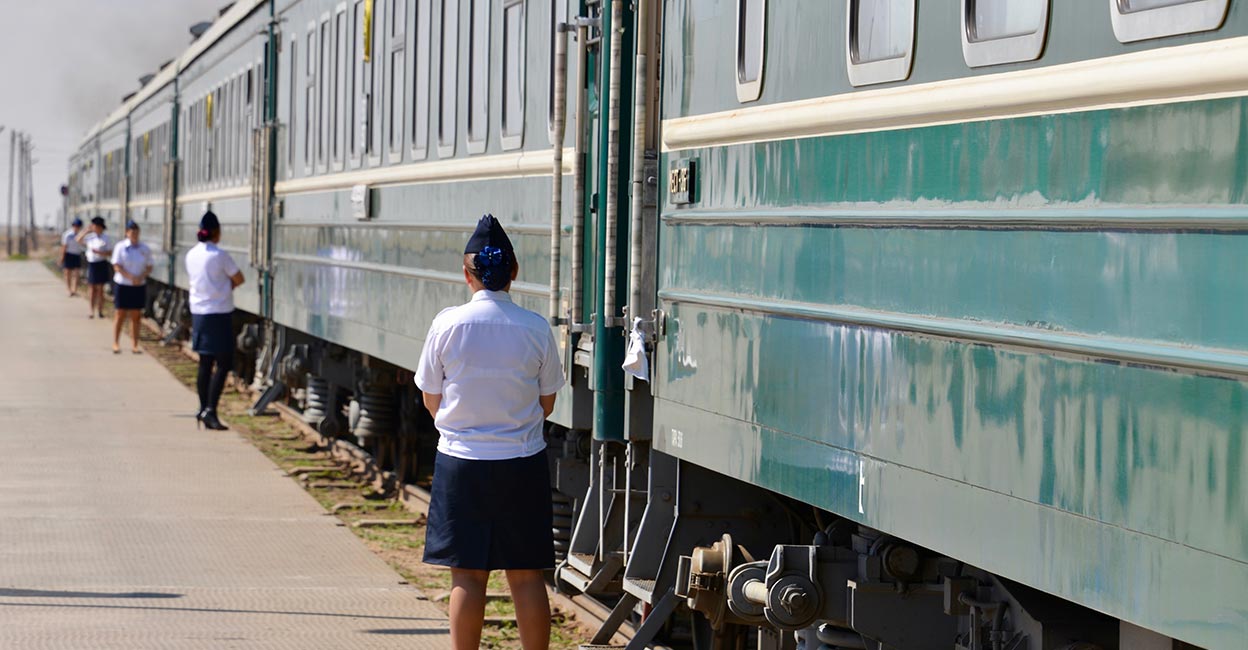
Store your precious articles in the locker behind the backrest of your seat. Don't forget to take the valuables from the locker before the destination. Or else you may keep them in the luggage fastened to the seat.
On the flip side, though baggage is screened as soon as we enter the railway station, the system is not apparently foolproof as the scrutiny is not as intense as in the aviation sector.
Seek the help of the conductor, when required. They are considerate, polite, warm and courteous. Language barrier, of course, is an issue for non-Russians. The conductor will come to you and alert your destination is appproaching. You are alerted if you drift away from the train, especially if the halt is short.
The conductors also keep a tab on the cleanliness. They ensure the loo is well-stocked with tissue rolls, handwash gel and shower gel. They don't mind wiping the minor mess on the floor even though janitors are onboard for vacuuming, sweeping, and mopping floors.
Please return the bed linen to the conductors before you alight. You will be doing them a favour if you fold them well.
4. Food and drink
Trans-Siberian trains have well-stocked onboard restaurant car. Food and drink, including beer and liquor, are available here. You can order food online using the WiFi access to the train restaurant link; or else walk to the restaurant coach by making your way through other passenger coaches. The menu is limited and the prices are almost en par with that in a city restaurant.
The water dispensed on the train is safe to drink. Hot and cold options are available on the electric samovar/heater in every coach. Make tea as much as you wish. Buy tea bags and sugar pouches from the train conductor if you are not carrying some or you exhaust your stock. Ice-cream too is available.
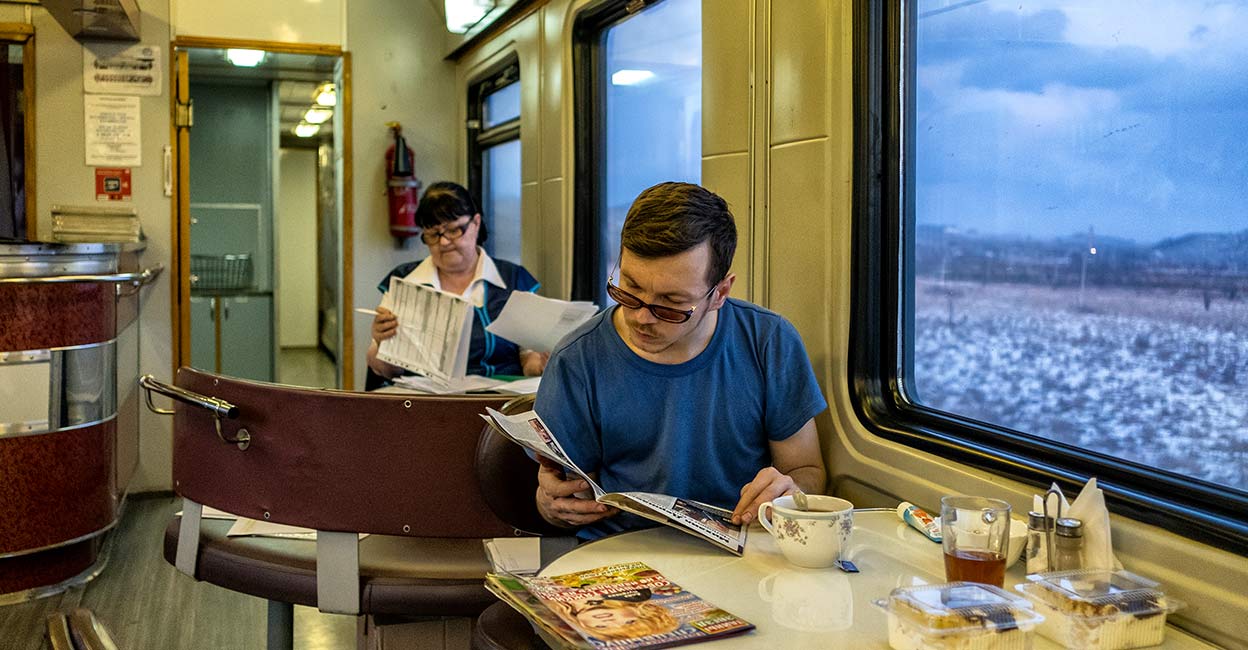
Glance at the onboard glass shelf. It has cookies, chocolates, branded water, trinkets and souvenirs. Yes, onboard shopping is a diversion. That potato starch and noodles in plastic container could be handy for breakfast. Just add hot water and stir.
Use your local currency to operate the automatic snack- and beverage-vending machine placed near the samovar. Cookies, wafers, chocolates, colas, water and other bottled drinks are available. Please keep in your pouch several coins as you may have to load them apart from the notes to 'download' packed branded food and drinks. Credit cards issued only in Russia are now valid.
Snacks, fruits and beverages can be purchased from hawkers on the platform too, but if you are unlucky, one may not be near your coach as the train halts at a station. The number of hawkers on the platform is negligible and they are conspicuously silent when compared to the boisterous platform vendors as seen on the Indian Railways network. As soon you approach a hawker, often an old lady (babushka in Russian) selling home-made fare, point to the item you want to buy. Don't worry about language barrier; the vendors will show you the price by keying it on the calculator. Even the balance to be returned to you will be thus shown on the calculator screen, a practice quite common all across Russia. Generally, the quality of food sold on the platform is okay, but be careful not to spoil the journey with an upset tummy.
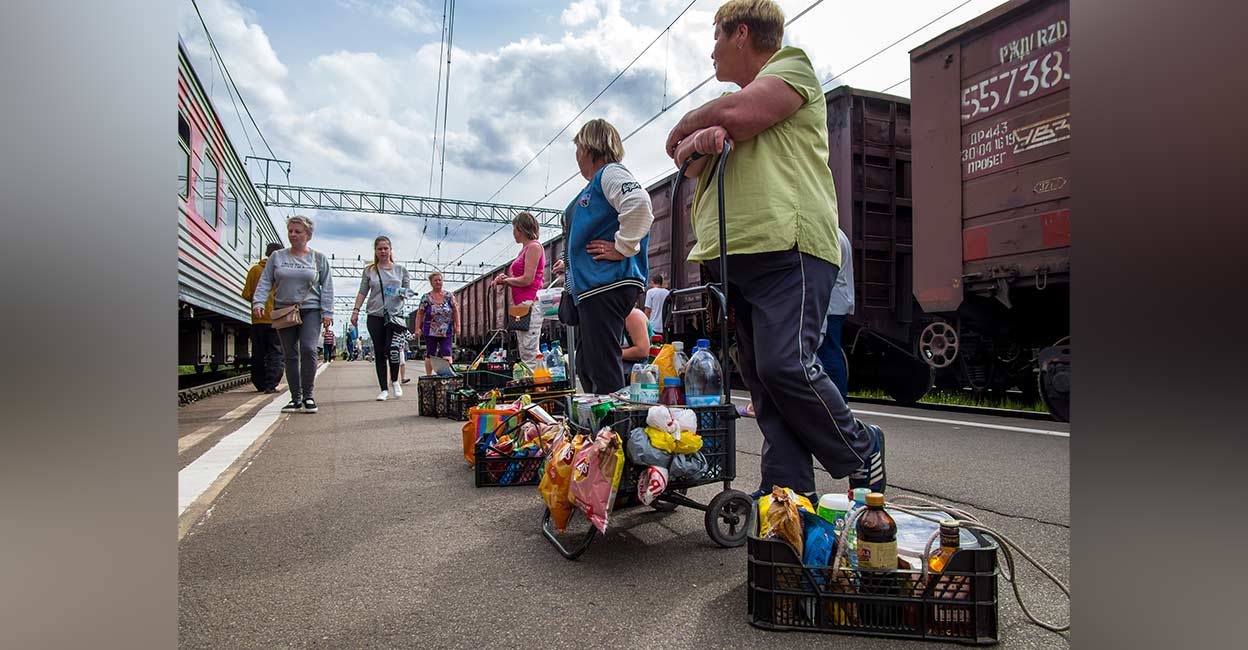
Almost all travel websites advise Trans-Siberian passengers to stock upon essential stuff such as bread, tea bags, fruits and ready-to-cook items before boarding the train for the long ride ahead. This makes sense not only to save money but also for avoiding food risks especially if you are picky about what to eat and drink. Also, the halts at stations on the way are often only for a few minutes and a halt station arrives after a ride for several hours; hence any thought to buy only fresh purchases from platforms is foolish.
Check the onboard timetable to know the halting time of your train. Any halts of 5 to 10 minutes are safe for a platform stroll or to buy food from vendors on the platform. Small stations are unlikely to have kiosks. Look for the sign магазин or magazin just outside the platform at some stations. These are well-stocked stores selling food, beverages and stationery required by train passengers. Regular passengers know which stations have stores. You may see passengers heading to the store. Beware! Trains in Russia depart without sounding you with that long horn that riders on Indian trains are well familiar with.
NOTE: Since mid-2022 cards like Visa, Master Card, American Express issued outside Russia cannot be used in the country owing to the financial sanctions imposed by western countries on Russia following its 'special military operation' in Ukraine. Booking hotels as well as domestic flights and trains in Russia from abroad is also impossible as online payment cannot be carried out.
5. Fare: How to book tickets
The ticket fare for premier trains, including firmeny, is always more than that for slower or unbranded trains.
Also, the fare is higher during peak season especially for premier trains, including firmenny. Pay more than the normal rates if you plan the trip during New Year and Easter as well as from July to August when it is summer in Russia — the busiest tourist season.
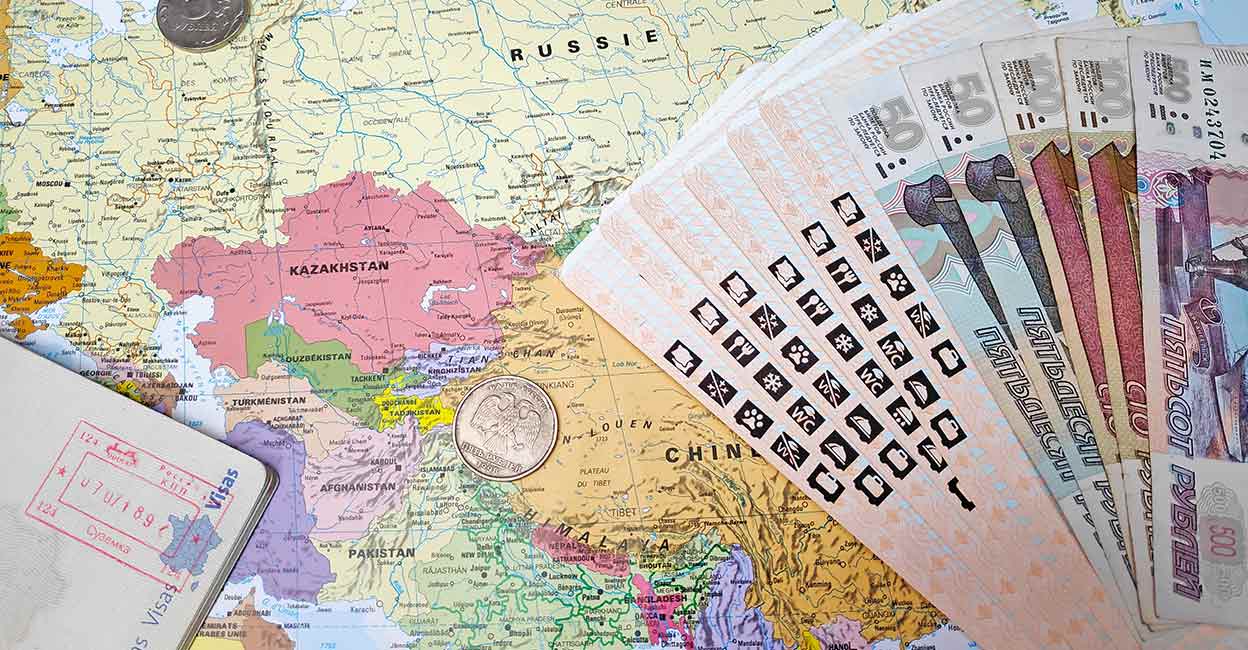
You may benefit from lower fares if you book during January and February when winter is at its peak. A winter ride on the Trans-Siberian route offers a surreal experience.
You can book ticket for the Moscow-Vladivostok ride 90 to 120 days before the intended trip date. This is the booking window allowed for domestic travel, though expect exceptions on certain routes at times. But for an international journey, say Moscow to Beijing or Moscow to Paris, tickets can be booked with Russian Railways only 60 to 90 days in advance. (Trains to European cities are currently suspended due to Western sanctions. Trains to China and Mogolia from Russia have resumed following the long ban in the wake of COVID-19 pandemic.)
If you are planning a Trans-Mongolian or Trans-Manchurian trip, please note the advance reservation period is much shorter than that available for the Trans-Siberian trains. Generally, Mongolian Railways issues tickets only two weeks before the departure date, while the Chinese Railways allows 15 days. Both may extend or shorten the period during peak seasons based on demand and public holidays.
China Railway tickets are sold out fast during the Chinese New Year and the National Day holidays from October 1 to 7, both being the peak travel seasons.
Foreigners may find it difficult to book tickets at railway counters in Russia, China and Mongolia due to language barrier.
The official ticket booking websites in English for the Russian Railways is https://eng.rzd.ru/ (ww.rzd.ru is the Russian language version.) and for the China Railway is www.12306.cn
Unfortunately, the ticket booking website of the Mongolian Railways (MTZ) — www.ubtz.mn — cannot be relied upon as it doesn't have an English version. Moreover, it is often found down.
The aforementioned Russian Railways website may not be accessible in some countries owing to the Western sanctions against Russia.
It is prudent to approach recognised private travel agencies for purchasing tickets well before the booking period for your intended journey commences.
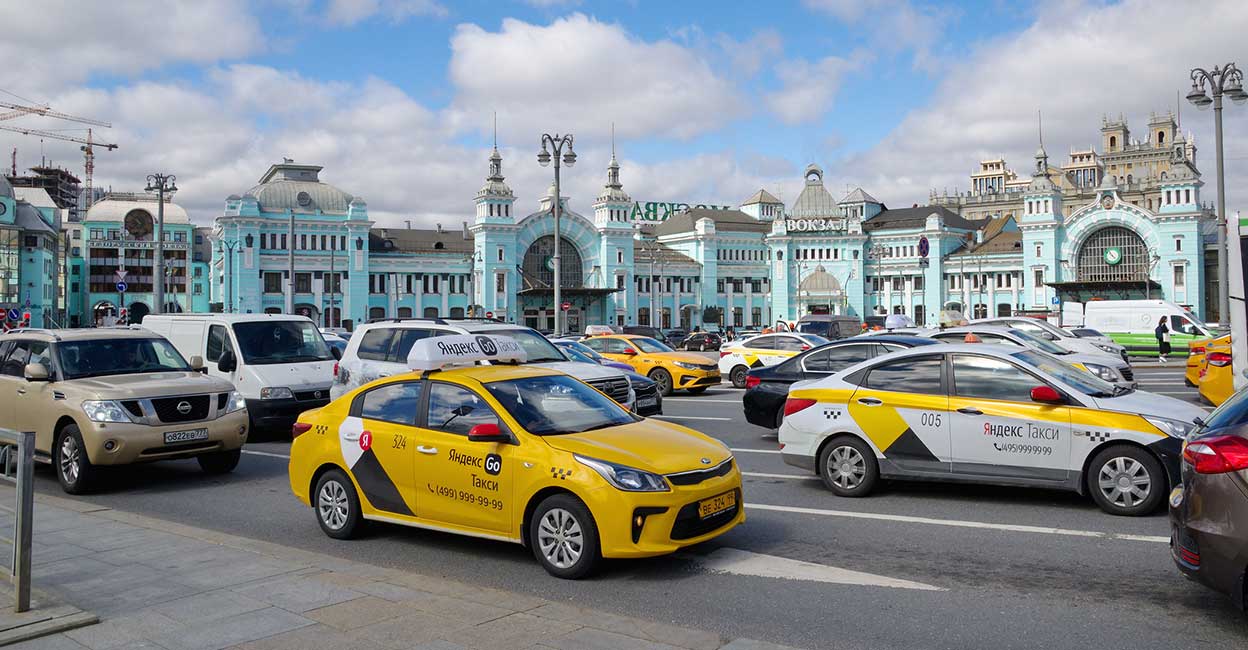
Sample fares
The Rossiya (Train 001Э) Second Class and Third Class fares for the Vladivostok-Moscow journey on April 7, 2023 were shown as $313.34 and $178.94, respectively on a booking site.
On the same date, the First Class, Second Class and Third Class fares for Train no. 061М on the same route were $782.73, $292.20 and $178.94, respectively.
The Rossiya (Train 002Э) Second Class and Third Class fares for the Moscow-Vladivostok journey on the same date, April 7, were shown as $290.34 and $178.94. For a Second Class and Third Class ticket on Train 002Э a day later, April 8, the fares were $267.33 $178.94, respectively.
Also, the Second Class and Third Class fares for Train no. 062М for the Moscow-Vladivostok journey on the same date were $276.43 and $178.94, respectively. The First Class fare was not shown as it was likely full as the comparison was made a week ahead. But a day later the fares for the all the three classes were shown as $835.36, $344.79 and $178.94, respectively.
The fare for the Third Class open sleeping wagon or platzkart is constant for the two trains in either direction as it is regulated in the interest of the natives. The fare for the Third Class comes to about 13,957 in Roubles.
The First Class and Second Class fares in the local currency for the aforementioned quotes USD 782.73 and USD 292.20 for April 7 were 61,052 and 22,791.
You incur currency conversion charges and tax in your home country as you book online.
(1 USD = RUB 78 as on April 1, 2023.)
NOTE:
1. As you get the ticket please check the exact timings, dates, departure and arrival stations as well as the number of meals to be served if you have opted for 'with services', which means 'with meals'.
2. Please take a printout of electronic tickets and keep a few copies with you. You may either show the soft copy on your phone or the printout to the train conductor. In major stations in Russia, rarely do railway employees ask for the hard copy.
3. Local time is displayed on Russian railway timetables and online booking portals.
4. Child discount: Children aged 10 and above must pay full fare on Russian trains. It is only half for 5-9 age group and travel is free for 0-4 age group, i.e., infants and those up to 4 years. IMPORTANT: These free travellers too must have tickets: 'Free of charge' ticket has to be obtained with the name of the baby/child even though no seat is reserved.
5. Fares in United States Dollar, $.
6. Likely expenses
Before estimating the expenses for the Trans-Siberian trip you should decide on a few aspects. Are you going alone? Are you booking the trip through a tour company? Do you intend to break the journey and visit cities on the way? Which class of carriage is comfortable to you? Which season you intend to take the trip? Which part of the globe you are? How many days you want to stay in Russia?
The Trans-Siberian train fare by itself is not prohibitive, but you have to add the return flight fare from your home country, visa fee, cost of mandatory insurance/medical tests, the hotel accommodation cost, taxi fare, food expenses, entry ticket prices to tourist centres/museums, some money to be earmarked for shopping, tips, miscellaneous/contingency expenses.
For more on Moscow city tour, click here and here
You can arrive at an approximate amount by adding up all the above heads. The cost of packages offered by tour companies often include most of these heads, except for your personal expenses. They list out the exclusions and inclusions.
For a two-week-long Trans-Siberian Moscow-Vladivostok trip with a few days of multi-city tours and hotel stays, tour companies may charge about USD 3,500 for a person. The equivalent cost in a few other important currencies: Euro 3,500, GBP 3,000, Indian Rupee 300,000, Chinese Yuan 25,425. (All approximate rates as on March 2023.)
This estimate is inclusive of the return air fare. The total package cost could be lower for conducted group tours. The cost may go down substantially if you do all the bookings alone.
Daily personal expenses obviously depend on one's financial status and lifestyle. You may set aside a minimum of 1,000 to 3,000 Roubles per day for basic personal expenses. The figure may go up with a couple of taxi rides or vists to fancy restaurants, bars or clubs. Travel companies often include the breakfast in the package.
Hotel rates for a night in three-star hotels will be about RUB 5,000 to 7,000. Pay double that in a luxury hotel. For about RUB 1,200 you will get a double room in a budget hotel. The budget traveller may get a bed in hostel or dormitory in the centre of Moscow for RUB 800.
Taxi fare in Russian cities like Moscow for short rides during day is about RUB 600. A single ride on the Moscow Metro will cost only RUB 55 Rubles (as of March 23). Pay RUB 35 for a short ride on a city bus. Shell out RUB 1,500 to 2,000 for airport ride from the centre of Moscow at daytime.
A decent meal for one person at an ordinary restaurant in Moscow will cost about RUB 600 and nearly twice in a medium-scale restaurant. With RUB 3,000 or 4000 three of your group can have dinner in a good hotel. Tip generously: 10% of the hotel bill is a decent tip. For guides you may give RUB 500 for a few hours or half day's service.
The approximate prices of food and drink in Roubles are: Bottled water (1.5 liter) 45, bread (500 gm) 50, banana 85-95, apples 110, oranges 120, domestic beer 80-100, imported beer 150-200, wine (medium) 500, Coke/Pepsi 70, coffee 75- 150, black tea 40, pizza 600-800, local snacks 80-150, fast food meal 400, whisky/gin 2,200, rum 1,800, vodka 1,200.
NOTE: ₽ is the sign of Rouble, the Russian currency. RUB is the ISO Currency Code just like INR denotes Indian Rupee and USD stands for United States Dollar. ISO currency codes are the three-letter alphabetic codes.

